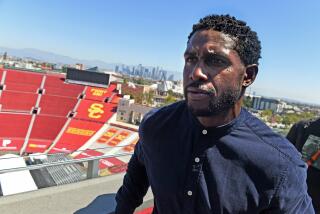Bush is one target of lawsuit
On a day when USC ensconced Reggie Bush’s jersey under glass at Heritage Hall, allegations that the former tailback received cash and gifts from a would-be sports marketer while still playing for the Trojans made their way into a San Diego County courthouse.
A civil lawsuit filed Tuesday afternoon by Lloyd Lake alleges that Bush and his family accepted more than $291,600 over the course of roughly a year.
Lake’s attorney, Brian Watkins, said his client is scheduled to discuss the matter with NCAA investigators Friday. NCAA rules prohibit extra benefits for athletes.
According to the suit, Bush, his stepfather, LaMar Griffin, and mother, Denise Griffin, began asking for money starting in November 2004 when they claimed to have “fallen on hard times financially and required immediate and significant financial assistance to support their respective lifestyles.”
That money allegedly included about $13,000 that Bush used to purchase a 1996 Chevrolet Impala registered in his name, Watkins said. The suit also alleges that the defendants “promised repayment of monies lent and advanced” and that on Jan. 14, 2006, Bush “reaffirmed his commitment to repay Plaintiff in a written communication” but never did.
Now in his second season with the New Orleans Saints, Bush has repeatedly said that neither he nor his parents did anything wrong. His attorney, David Cornwell, could not be reached for comment.
Told that Lake had filed suit, USC Athletic Director Mike Garrett said, “Good for him.” Coach Pete Carroll declined to comment.
Some people close to Bush have contended that unscrupulous agents led the young athlete and his family astray. Others have questioned the credibility of Lake, a documented former gang member who has been in and out of prison over the last few years.
The case has been of special interest to NCAA and Pacific 10 Conference authorities, who have struggled to procure interviews with the principles.
Now they could have court evidence to work with. A source close to the case told The Times in January that Lake had tape-recorded conversations with Bush and his stepfather talking about cash and gifts.
If investigators find that Bush received improper benefits while in college, USC could be forced to forfeit games. The program could face further sanctions if it were proved that coaches and administrators knew or should have known about the alleged benefits.
In January, Jordan Cohen, a lawyer for Lake’s business partner, Michael Michaels, said that in researching the case he had found “no information or indication that USC had actual knowledge of any of this.” Watkins noted that USC running backs coach Todd McNair socialized with Michaels and Lake at least once, but might have known nothing about the business arrangements.
However, Bush could be asked to return the Heisman Trophy he won as college football’s top player in 2005 before he left school for the NFL with one season of eligibility remaining. In his three seasons at USC, the Trojans were 37-2, won one national championship and shared another.
The controversy erupted in the spring of 2006 after Lake and Michaels alleged they had sought to create a marketing agency called New Era Sports & Entertainment with Bush as their star client.
In previous interviews, Watkins and Cohen detailed their clients’ version of New Era’s short, troubled life.
Michaels and Lake were unlikely candidates for a sports-related venture. Michaels was a real estate investor and an official for the Sycuan Indian tribe’s development corporation. Lake had been convicted of a felony drug violation and was on probation.
The attorneys said Lake knew Griffin and introduced him to Michaels at a San Diego Chargers game in 2004. They said Bush and Griffin proposed forming the agency as a way for the college star to avoid paying a percentage of his earnings to an established agent when he turned professional.
According to Watkins, Griffin soon began asking for favors.
First came $28,000 to help repay family debts, Watkins said. Then, in the spring 2005, the Griffins moved into a three-bedroom house that Michaels had purchased east of San Diego. Watkins said the family agreed to a monthly rent of $4,500 but never paid.
The suit alleges that the defendants “promised that they were borrowing from Plaintiff and New Era Sports only and that they would not borrow money or accept monies from any other person or entity without expressly notifying Plaintiff in advance.”
New Era began to fall apart after USC lost to Texas in the 2006 Rose Bowl and Bush signed with marketing agent Mike Ornstein. Soon after, the Griffins moved out of Michaels’ house.
The suit claims that when the Griffins traveled to see USC play California the previous season, an unnamed third party paid some of their expenses.
According to a previous Yahoo.com report, the expenses were charged to a credit card belonging to an Ornstein employee. Ornstein has denied any wrongdoing. Yahoo also detailed further allegations, saying that New Era paid for Bush to stay in hotels in San Diego and Las Vegas.
Lake and Michaels subsequently threatened to sue Bush for $3.2 million.
Cornwell countered by accusing New Era of trying to extort money from the player and, at one point, the FBI opened an investigation into the agency.
In April, Michaels reached an individual settlement with the player and his family. Sources said the settlement was for $200,000 to $300,000, according to a Yahoo report.
Though it has been thought that Michaels put up most of the investment for the failed New Era, this week’s lawsuit contends that Lake, as a general partner in the agency, is owed compensatory damages, fees and other relief.
--
More to Read
Go beyond the scoreboard
Get the latest on L.A.'s teams in the daily Sports Report newsletter.
You may occasionally receive promotional content from the Los Angeles Times.







